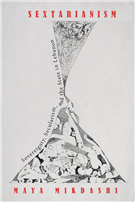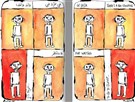My mother`s mother tongue is not Arabic. This singular fact shaped much of my life and my education in Lebanon. When she moved to Beirut, she had two children, and then me in her belly. She met a student named Maya and thought the name sounded beautiful and strange. She has not lived in the country in which she was born - the country in which her family lives, celebrates holidays, and has grown older - for over three decades now. This fact terrifies me.
Prior to her moving to Lebanon, my father had spent almost fifteen years in the United States, attending universities and later, teaching in them. He is always asking me when I will return home. He is always checking, now that he has a smartphone, if I am eating enough fruit and leafy greens. He wants me here, though he was the first to support me when I came home one day more than ten years ago and announced that I was leaving, not for a job or for school. Just leaving. To act. To write. To love. To do that thing I had seen in American movies all my life in Lebanon: “find myself.” The rest would come later, once I had left. He did not believe that I would last more than six months in New York City, a twenty-year-old with a BA in arts from a Lebanese university. My mother knew better.
When do you internalize the stigma (as self doubt) intended by that hurtful word, “outsider?” At what point do you recognize yourself as part of a “brain drain,” as an expat? When do you stop making fun of those Lebanese Americans and Lebanese Parisians on an airplane, with their strange accents and their even stranger overcompensations? When do you realize that they are probably reading you in the same way? Can your life be exilic when the experience of exile comes by those deceptive six letters, “choice?” If you choose to leave a home, even if the constellation under which that choice was made was coercive, is that exile? What does it mean to live a life that is exilic, when you are leaving a region, a country, families that are pockmarked with all those that have left? If exile is incompleteness, being ill at ease, and melancholic, who can lay claim to it? Why do I, writing now from Beirut, think of Edward Said, writing from New York about Palestine, Iraq, Lebanon, and all those other places? He wrote that “it [exile] is the unhealable rift forced between a human being and a native place, between the self and its true home: its essential sadness can never be surmounted."
Is there safety in clarity? Will I be safer, feel more confident, if I insist on the singularity of this, my, exile? If I write the “I”?
Exile is the promise of an always deferred return: Not now. After the PhD is in hand. After the first job. After the book comes out. After tenure. If, and when, I can truly live my live openly and freely in Beirut. When I am ready to have children.
Exile is laughing, loving, and dreaming in Arabic. It is writing in English, each letter tracing the arc of your removal - the distance you are traveling right now, while hunched over a piece of paper writing the beginning of a thought or feeling. It is leaving when the price of labneh is five thousand five hundred liras, and returning to find it is now six thousand liras.
It is constantly justifying why you have not yet returned. It is the gray hair that multiplies on your father`s head between one return home and the next. It is new restaurants opening in Hamra, old words that have been resignified with sarcasm, and relatives and friends and exes now married and gone, or gone and returned, or just constantly returning.
Exile is tactile. It is sensuous. It is anticipating a touch, a smell, that never comes. It is a person you no longer know, the taste you can no longer articulate, your favorite childhood juice store that has long been transformed into a store stocked full of clothing made in China. It is longing for language, the impossibility of translation, and relying on others to remember your self five, ten years ago. Before you left. Before. It is the sharp pain that can never be communicated by the word “nostalgia.” It is watching a war unfold and wanting to rush home, the war and the family and the friends together. It is wondering if you are sick or too self-involved for even having these thoughts. It is wanting to double yourself, just to see what your life would have been like had you never decided to join that person, pursue that idea, so far away.
It is never really being here, and never really being there. It is insisting that, given the time actually spent here and there, that you have only really been gone for five, six years. Eight months here, four months there. Two years here, two weeks there. It is time as arithmetic, distance as calculus. It is a life spent in between, on telephones and on email. It is having to explain yourself in both places. It is the shock of dissimulating, so easily, as you step off a plane. It is not being able to imagine a different way of being. It is dreaming of return, planning it. It is finding reasons why not yet. It is writing these words in English, which I probably would be doing had I never left Lebanon---yet it now means something different because when I was twenty I stood before my parents and told them I had to leave. I just had to. It is being estranged from your reason, your plan, for leaving.
Exile, as CLR James stated, is always - even if you do end up returning - a one way trip.
![[Still number 72. Image by Randa Mirza]](https://kms.jadaliyya.com/Images/357x383xo/airlplane.JPG)










